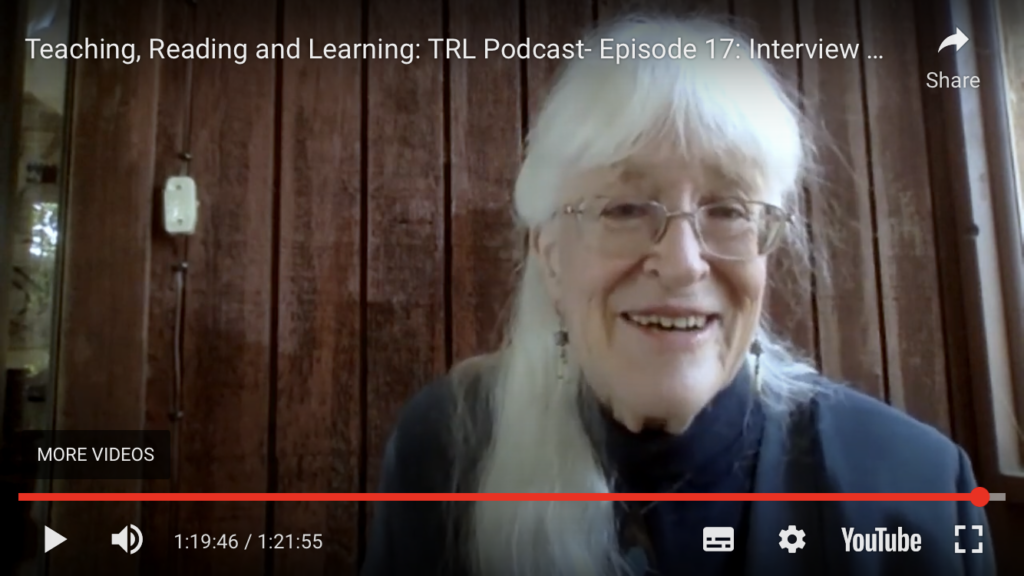What sounds did you SAY (not just hear) in that word?
0 Replies
If you haven’t listened to the US Reading League’s podcast with Dr Jeannine Herron, or watched it on YouTube, I highly recommend it. She’s an inspiration, the perfect tonic if you’re feeling a bit wearied by swimming-through-COVID-mud, as I am.
At 84, she has a wonderful laugh, rogue chickens, and is planning to write a new program, not resting on her life’s laurels as a teacher, activist, research scientist, adventurer, writer, editor, and a program and software developer.
Our new Australian Curriculum, and next weekend’s Federal election, have made me think a lot lately about the role of education in achieving a fair, peaceful and sustainable future. My lockdown cheer-up project was writing a kids’ book called “I Love A Sunblessed Country”, which you can read in 90 seconds on this website, where signed, printed copies are also available (only if you’re in Australia, and please tell me whose name to write in it). I’m hoping it will spark lots of conversations with kids about what kind of future they want, and how it might be achieved. So I was very happy to hear Dr Herron’s story of being able to integrate her professional life and activism.
Four professionally-relevant things Dr Herron said stood out for me, which I’ll try to summarise here (my apologies if I’ve oversimplified or otherwise misinterpreted):
Speech is the engine of reading and writing
Thinking you can learn to read with your eyes and ears is a mistake. Speech is the basis of the systems in the brain that are necessary for skilled reading, and kids need to start from their own speech, learn that the words they say are strings of sounds, and that letters stand for those sounds.
Phoneme awareness and phonics need to be taught as kids are learning to write. Phoneme awareness only becomes meaningful when you attach letters to the sounds, and understand that the sounds you’re making with your mouth can be put on the page with letters.
We’ve long regarded phonemes as sounds, and in the classroom we ask, “What sound did you hear at the beginning of that word?”, rather than “What sound did you say at the beginning of that word?” It is the motor system that segments, blends and manipulates phonemes, and it’s motor memory that helps us remember the sounds and spellings. The ears are important because you have to have feedback, but it’s the articulation of the sound that your brain is actually using in order to become aware of phonemes.
To orthographically map words so they can be instantly recognised (Herron suggests the term “auto words” instead of “sight words”), you need automatic phonemic awareness. Embedding the shape of a letter into a picture that contains the sound (e.g. in these pictures) helps children remember sound-letter relationships.
Writing and reading should be integrated
Writing and reading should be taught in an integrated way. As adults we read more than we write, and we value reading more than writing, but it makes more sense to first teach young children to represent the sounds in their own mouths with letters.
Encoding and decoding words are like breathing in and breathing out, they are two parts of the same whole.
Resources need to be better targeted
We invest a lot of resources in reading and writing intervention, but it would be better to invest more in preventing problems in the first place. We know how to teach reading and writing, and we should be applying this knowledge from at least preschool.
Teachers are not well-prepared to teach reading and writing, and are very time-poor, so they need short training videos online, where they can see other teachers modelling good practice, and showing them how to work from simple to complex.
Our mission is to raise people’s intelligence
We who are involved in teaching reading are really on a bigger mission, to raise people’s intelligence. Herron says, “The most radical thing we can do besides getting into the streets is to provide an adequate and just and equal opportunity for education for all children”.
Herron says she is reading the Pulitzer Prize-winning book The Swerve, about the influence of an ancient Roman manuscript full of then-dangerous ideas on the Renaissance. Asked her greatest hopes for today’s children, she says: “I want that literacy revolution to happen. I want them to become independent, joyful readers and writers. I think that we’re facing a dark place in our country with a lot of magical thinking, a lot of uninformed thinking, a lot of disrespect for science and rational thinking, and I think it’s very dangerous, and I think the education system needs to deal with it, and … I hope we can have a swerve of our own to a new Renaissance”.
I spent much of yesterday standing in the rain at an early voting centre, handing out How To Vote cards for my friend and local MP, and having strange conversations with other booth volunteers about whether volcanoes are the main cause of climate change, whether COVID-19 is real, whether vaccines are a conspiracy etc. So I couldn’t agree more on the importance of making sure everyone has the reading, writing and scientific skills to use their frontal lobes well.
You can watch The Reading League’s Laura Stewart’s excellent interview with Dr Herron in the embedded video below, or listen to the podcast here.
*



Leave a Reply